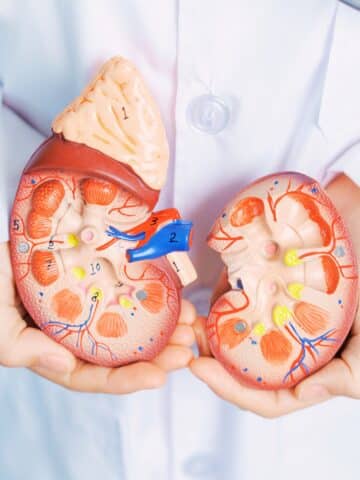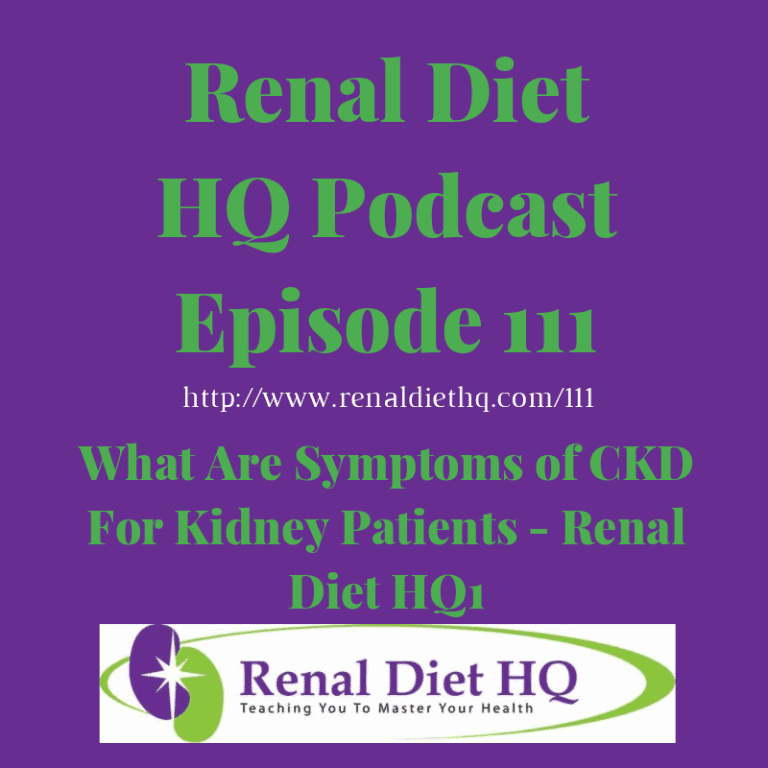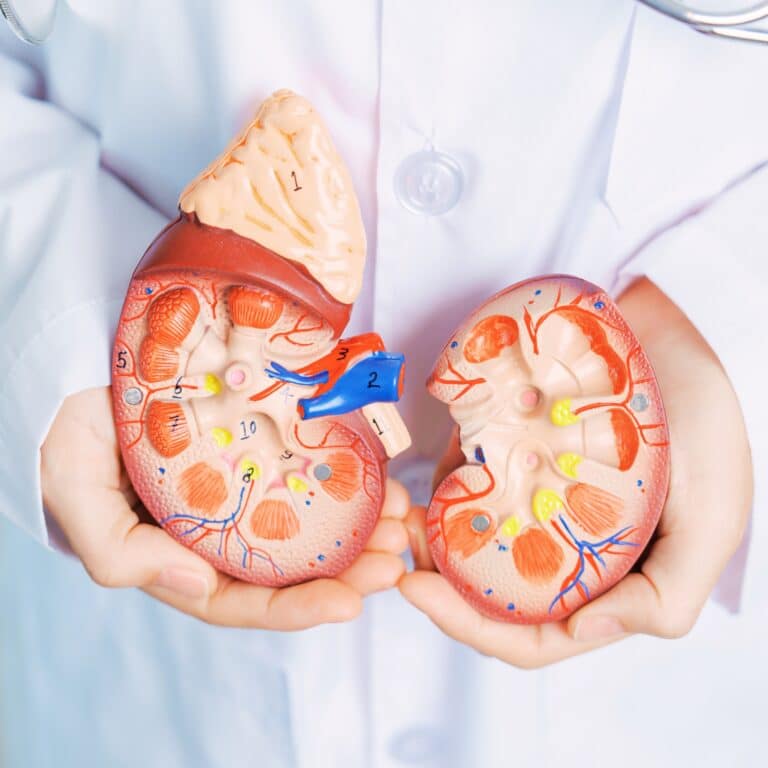CKD and Heart Disease
With heart disease being the leading cause of death for adults in the U.S., it is imperative that everyone understands the seriousness of this condition. According to the Center for Disease Control (CDC), "About 695,000 people in the United States died from heart disease in 2021—that's 1 in every 5 deaths."
And if you already suffer from chronic kidney disease (CKD), you are automatically at risk for heart disease.
In fact, more chronic kidney disease patients die from heart disease or related problems than they do from kidney failure.
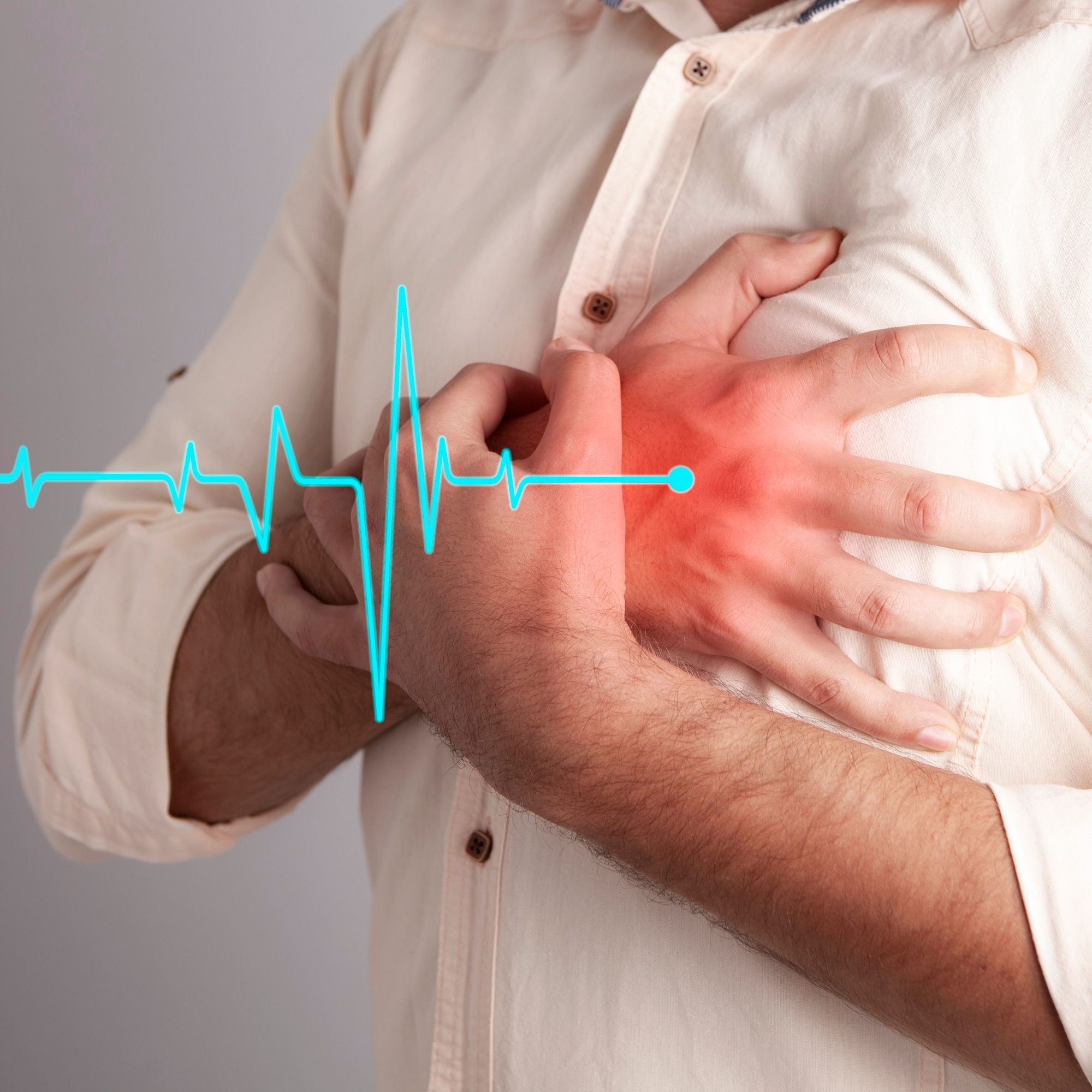
If you have CKD, you better pay attention to this health topic due to your excess risk of death from cardiovascular events.
Jump to:
- Key Takeaways
- What is Heart Disease?
- What are the Risk Factors of Heart Disease?
- How are Heart Disease and Chronic Kidney Disease Related?
- Understanding the CKD-Heart Disease Connection
- Heart Protection for CKD Patients
- Dealing With Kidney Failure, Dialysis, and Its Impact on Heart Health
- Unpacking Heart Disease and Its Risks
- Lowering Heart Disease Risk
- Frequently Asked Questions
- Heart Health and Kidney Health Are Connected
Key Takeaways
- Heart disease falls under cardiovascular disease (CVD), encompassing various heart and blood vessel conditions, particularly coronary heart disease that obstructs flow of blood cells.
- High blood pressure, cholesterol, smoking, diabetes, obesity, excessive alcohol, and a sedentary lifestyle contribute to cardiovascular risk factors.
- Hypertension and diabetes, shared causes of CKD and heart disease, elevate the risk for both conditions.
- CKD worsens hypertension, stressing the heart which can lead to ventricular hypertrophy, and hindering kidney function, creating a detrimental cycle.
- Excessive glucose in patients with diabetes damages blood vessels, affecting kidneys and heart similarly, linking this disease to both CKD and heart disease.
For More Recipes and Ideas --->> Get Your Free Meals and Recipes That Are Perfect for Pre-Dialysis Diets, Pre-Dialysis with Diabetes, or Dialysis Diets.
What is Heart Disease?
There may be some confusion about the term "heart disease" and what it entails. The larger umbrella term is "cardiovascular disease (CVD)" which refers to conditions related to the heart or blood vessels.
For example, this umbrella includes both leg thrombosis, peripheral artery disease, ischemic events, atrial fibrillation, chronic heart failure, and coronary heart disease, even though they are different conditions.
Heart failure is a subset of CVD, which usually just refers to any condition where the heart cannot properly pump blood throughout the body.
Heart disease significantly increases your chances of poor cardiovascular outcomes such as heart attack or cardiac arrest, where your heart stops beating unexpectedly.
The most common form of heart disease is coronary heart disease, also called coronary artery disease. This is when the arteries that supply oxygen to the heart become partially or fully blocked by plaque buildup caused by cholesterol and other materials.
Once you have been diagnosed with heart disease, you will always have it. There are procedures that can help lessen your symptoms or possibly reduce the risk of a heart attack, but preventing the condition in the first place is always key!
What are the Risk Factors of Heart Disease?
There are some conditions that may contribute to your risk of having heart disease. These include:
- High blood pressure – Hypertension can weaken the heart and arteries. This makes it even easier for the arteries to be blocked by plaque.
- High cholesterol levels – The plaque that builds up in the arteries is created by excessive cholesterol in the body. High cholesterol is a key cause of heart disease because of all the pressure it puts on the arteries, eventually causing it not to get an irregular beat until it stops.
- Smoking – Tobacco can contribute to the plaque buildup in the arteries and veins. Nicotine helps raise your blood pressure, and the carbon monoxide lowers the oxygen your blood carries to your heart and other organs. Secondhand smoke can be just as dangerous for nonsmokers as smoking.
- Diabetes – People with diabetes tend to have a higher fat content in the blood. This can cause damage to the heart and blood vessels as well as create blockages.
- Obesity – Being extremely overweight is typically linked to other risk factors for heart disease, including high cholesterol, high blood pressure, and diabetes. All of these things combined together create a severe high risk of heart disease, which could lead to heart attacks from the pressure caused to this vital internal organ.
- Excessive alcohol consumption – Alcohol elevates your blood pressure and increases your triglycerides, which is a blood lipid similar to cholesterol.
- Sedentary lifestyle – Like obesity, being physically inactive is linked to other contributing factors of heart disease.
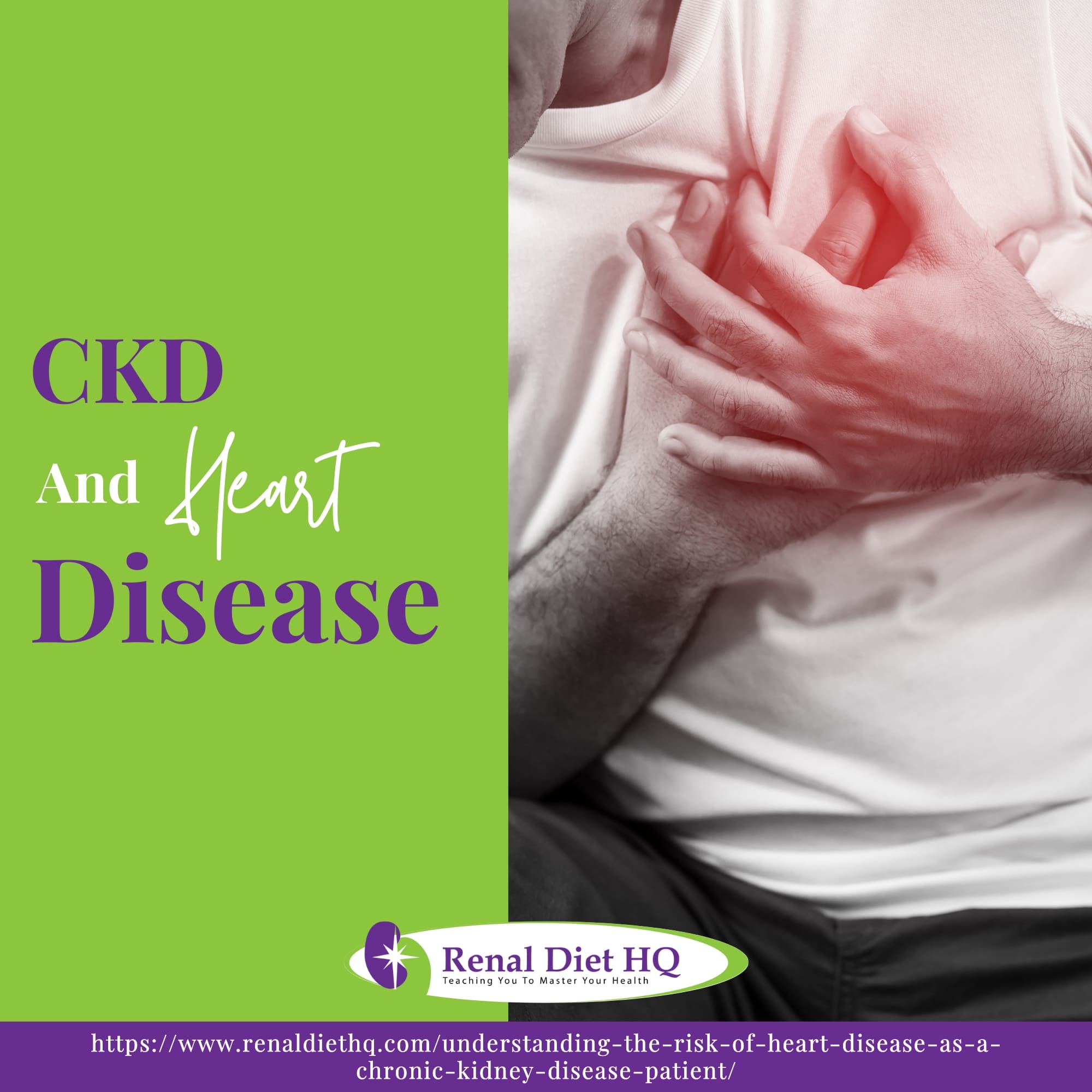
How are Heart Disease and Chronic Kidney Disease Related?
For one, both heart disease and CKD share primary causes: hypertension (high blood pressure) and diabetes.
So, if you have one issue, you are at a greater risk of developing the other.
High Blood Pressure
Chronic kidney disease can further complicate hypertension because your kidneys cannot work properly to filter excess water, salt, and wastes from the blood. Over time, high blood pressure weakens the heart and blood vessels.
In turn, having high blood pressure makes it difficult to get oxygen-rich blood to the kidneys. This accelerates the decline of kidney function for patients with chronic kidney disease. It's a vicious cycle that can truly compromise your health.
As stated above, high blood pressure is a common cause of heart disease. So it's easy to see why this condition and CKD are closely related.
Moreover, if left uncontrolled, hypertension can result in many severe and potentially fatal conditions. These include stroke, heart attack as well as kidney disease.
That being said, high blood pressure life insurance and income protection can be helpful in removing some of the worries that come with managing these health issues.
Consequently, you can learn more about the potential benefits of taking out life insurance when living with high blood pressure here.
Diabetes
For patients with diabetes, they often have too much glucose (sugar) in the blood. This overabundance can damage the blood vessels throughout the body, including in your kidneys.
Over time, your kidneys will stop functioning properly due to the excess glucose, causing chronic kidney disease to occur.
As mentioned, diabetes is a common cause of heart disease due to the buildup of plaque in the arteries and the damage that results.
Seeing that these two primary causes are shared by both heart disease and CKD, it's no real wonder how the two are so closely related. It's possible to solely have one medical condition or the other, but the overlap between the two has become so great, it is essential that you take care of yourself once you have been diagnosed with one of these diseases.
If you have a kidney disorder, you definitely want to make sure you are living a heart-healthy lifestyle!
Understanding the CKD-Heart Disease Connection
Chronic Kidney Disease intricately links to heart disease, amplifying cardiovascular risks in affected individuals. This section explores the intricate relationship between CKD and heart disease, shedding light on how CKD contributes to an elevated risk of heart conditions.
Understanding this correlation is crucial as CKD patients face heightened susceptibility to heart-related issues, emphasizing the need for proactive management and tailored interventions to safeguard both kidney and heart health.
Relationship Between Heart Disease and CKD
Chronic Kidney Disease and heart disease share a complex and bidirectional relationship, each influencing the progression and severity of the other. CKD significantly heightens the risk of heart disease due to several factors.
Renal impairment leads to electrolyte imbalances, fluid retention, and mineral disturbances, causing hypertension and left ventricular hypertrophy. Additionally, CKD induces inflammation, oxidative stress, and endothelial dysfunction, promoting atherosclerosis and coronary artery disease.
Conversely, heart disease exacerbates CKD progression. Reduced cardiac output triggers kidney hypoperfusion, activating the renin-angiotensin-aldosterone system, and leading to renal damage.
Cardiovascular events often cause acute kidney injury, impacting renal function. Moreover, heart failure-related therapies like diuretics can exacerbate kidney impairment by reducing renal perfusion.
This reciprocal relationship forms a vicious cycle: CKD heightens the risk of heart disease, and vice versa, perpetuating a cascade of events that exacerbate both conditions.
Effective management strategies involve addressing risk factors for both CKD and heart disease, emphasizing lifestyle modifications, blood pressure control, and close monitoring to break this cycle and mitigate the progressive impact on both organs. Understanding this intricate relationship is pivotal in devising comprehensive treatment plans for patients affected by CKD and heart disease.
Heart Protection for CKD Patients
Heart protection is crucial for Chronic Kidney Disease patients due to their heightened risk of cardiovascular complications. Strategies targeting heart health are essential in mitigating adverse outcomes.
Blood pressure control stands as a cornerstone; maintaining optimal levels reduces the strain on the heart and kidneys. Additionally, managing cholesterol levels through lifestyle changes and medications is vital in minimizing atherosclerosis risk.
Regular exercise and a heart-healthy diet play pivotal roles. Physical activity not only benefits the heart but also aids in controlling weight and blood sugar levels. Implementing a diet rich in fruits, vegetables, whole grains, and lean proteins supports heart health and reduces the risk of further kidney damage.
Moreover, close monitoring and early intervention are key. Regular check-ups, medication adherence, and prompt treatment of cardiovascular risk factors help prevent complications. Collaborative care involving cardiologists and nephrologists ensures a comprehensive approach, safeguarding the heart in CKD patients and potentially improving overall outcomes.
Dealing With Kidney Failure, Dialysis, and Its Impact on Heart Health
End-stage renal disease (ESRD also known as End-Stage Kidney Disease), the final stage of chronic kidney disease, marks a complete loss of kidney function. Dialysis becomes imperative with advanced kidney disease as the kidneys fail to filter waste and excess fluids from the blood adequately. This condition not only impacts kidney function but significantly influences heart health.
ESRD poses a considerable risk to cardiovascular health due to its association with elevated blood pressure, fluid imbalances, and electrolyte disturbances. Dialysis, while vital for replacing lost kidney function, introduces challenges to cardiovascular stability.
Hemodialysis and peritoneal dialysis aim to eliminate waste and excess fluid, yet their processes can trigger abrupt shifts in blood volume, potentially leading to fluctuating blood pressure.
Moreover, dialysis patients are prone to electrolyte imbalances like hyperkalemia, which can disrupt heart rhythm and function. This constant stress on the cardiovascular system heightens the risk of heart complications such as heart failure, arrhythmias, and coronary artery disease among individuals with ESRD.
The increased cardiovascular burden significantly contributes to higher mortality rates among dialysis patients. Addressing these risks necessitates meticulous heart health management, including regular monitoring, medication adherence, dietary modifications, and lifestyle changes to mitigate the adverse impact of ESRD and dialysis on heart health.
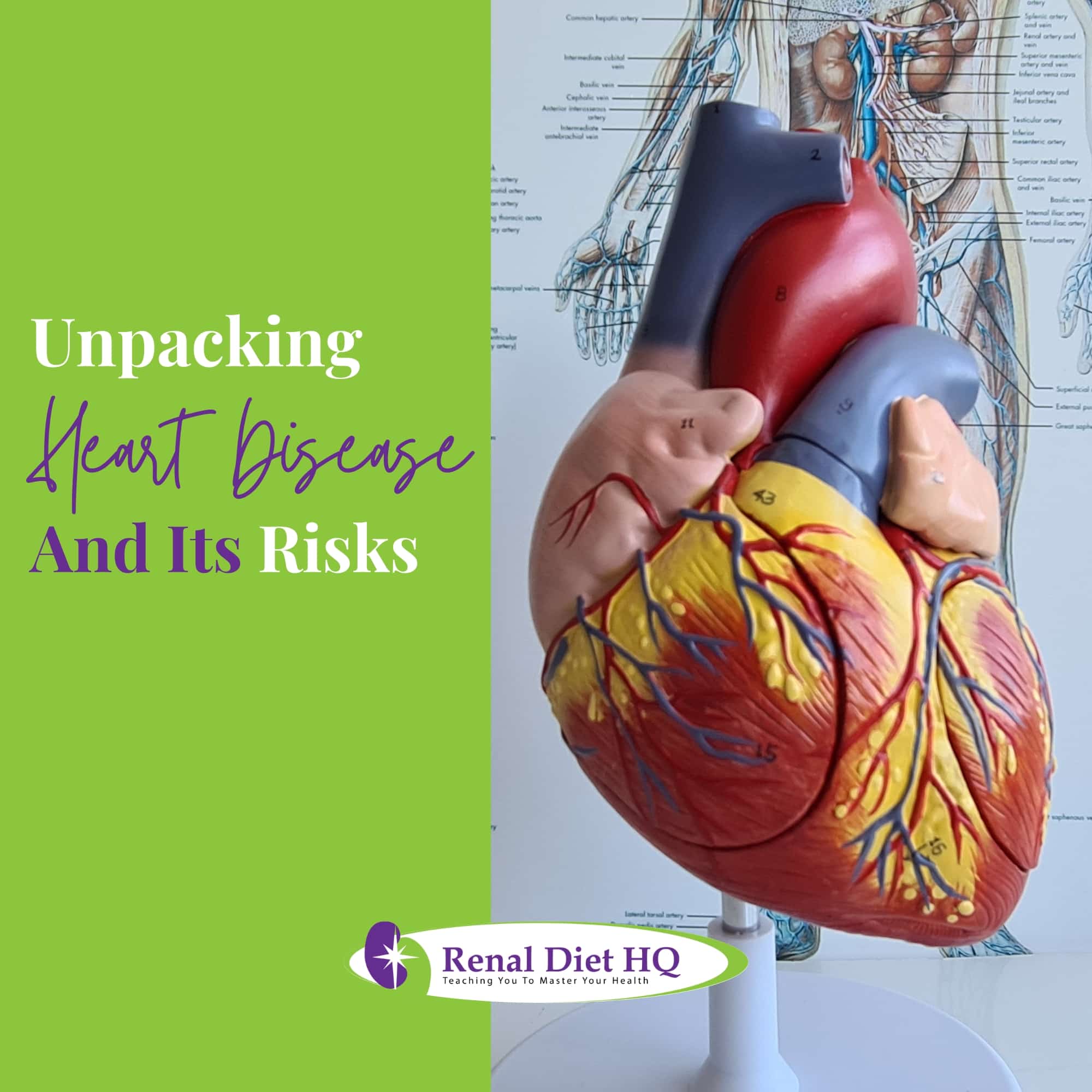
Unpacking Heart Disease and Its Risks
Heart disease encompasses various conditions that affect the heart's function and its blood vessels. The complications associated with heart disease can be severe and life-threatening.
Heart attack (myocardial infarction) occurs when blood flow to a part of the heart is blocked, leading to tissue damage or death. Heart failure, a chronic condition, weakens the heart's pumping ability, causing fluid buildup in the lungs or body. Arrhythmias are irregular heartbeats that can lead to fainting, stroke, or sudden cardiac arrest.
Atherosclerosis, the narrowing of arteries due to plaque buildup, can cause angina (chest pain) and increase the risk of heart attack or stroke. Heart valve issues can cause leakage, narrowing, or improper closing of the heart valves, impairing blood flow. Cardiomyopathy, an enlargement or thickening of the heart muscle, can lead to heart failure.
These complications significantly impact an individual's quality of life and require careful management and treatment to prevent further damage and potential life-threatening events.
Lowering Heart Disease Risk
Understanding your heightened risk of heart disease with CKD, it's crucial that you know how to lower this risk. By implementing lifestyle modifications, adhering to nutrition guidelines, following exercise recommendations, and utilizing stress management techniques, you can significantly reduce your risk.
Here are four key steps to consider:
- Lifestyle Modifications: Quit smoking, limit alcohol intake, and maintain a healthy weight. These changes can have a profound impact on your overall heart health.
- Nutrition Guidelines: A heart-healthy diet that's low in salt, saturated fats, and cholesterol, and rich in fruits, vegetables, and whole grains can help manage blood pressure and cholesterol levels.
- Exercise Recommendations: Regular physical activity, ideally 30 minutes a day, can lower your blood pressure and boost your heart health.
- Stress Management Techniques: Techniques such as deep breathing, meditation, and yoga can help lower your heart rate and blood pressure.
Prevention and Management Strategies
Let's dive into the various prevention and management strategies you can adopt to tackle both CKD and heart disease effectively.
Primarily, preventing complications is your top priority. Regular health check-ups, blood tests, and implementing the right medications, if needed, can aid in this.
Dietary recommendations play a significant role. It's essential to maintain a balanced diet rich in fruits, vegetables, whole grains, and lean proteins. Minimizing sodium, processed foods, and saturated fats helps in managing both conditions.
Don't underestimate the exercise benefits. Regular physical activity, as simple as brisk walking or cycling, can help control blood pressure and weight, thereby reducing the risk of CKD and heart disease.
Smoking cessation is crucial. If you smoke, it's time to quit. Smoking can accelerate the progression of CKD and increase the risk of heart disease.
Finally, stress management is a vital strategy. Chronic stress can negatively impact your heart and kidneys. Techniques such as meditation, deep breathing, and yoga can help manage stress effectively.
Lifestyle Modifications for CKD Patients
So how can you make lifestyle modifications to manage your CKD and reduce your risk of heart disease? Well, the answer lies in a combination of dietary changes, exercise recommendations, stress management, and seeking support from like-minded individuals.
- Dietary changes: Revamp your diet to include low sodium, low protein, and low potassium foods. Avoid processed foods and consume more fresh fruits and vegetables. Consult a dietitian for personalized advice.
- Exercise recommendations: Regular physical activity can reduce blood pressure and help manage your weight. Aim for at least 30 minutes of moderate intensity activity most days of the week. Always consult your doctor before starting a new exercise regimen.
- Stress management: Chronic stress can exacerbate CKD and heart disease. Practice mindfulness, meditation or yoga to help manage stress levels.
- Support groups: Joining a support group can provide emotional assistance and practical advice from others navigating similar health challenges.
Regular Monitoring and Check-ups
Regularly schedule your doctor's appointments to keep your CKD and heart disease risks in check. Regular check-ups are vital for early detection and effective management of these conditions. Consistent monitoring allows your healthcare team to keep a close eye on your overall health and adjust your treatment plan as needed.
Adhere strictly to the monitoring guidelines provided by your health care provider. This might include regular blood pressure checks, blood tests, or imaging studies. These tests help detect any abnormalities early, allowing for prompt treatment to prevent further complications.
Your healthcare support plays a key role in managing your conditions. They provide you with essential information and guide you on the necessary preventive measures. It's important to maintain open communication with them, discussing any concerns or symptoms you might have.
Remember, early detection is crucial in managing CKD and heart disease. It allows for timely intervention and can significantly improve your prognosis. Don't underestimate the importance of regular check-ups and constant monitoring.
Frequently Asked Questions
The management of CKD and heart disease evolves with age due to shifting health priorities. In younger individuals, preventive measures focus on lifestyle changes, medication, and risk factor control.
With aging, treatment often becomes more complex, balancing multiple health conditions and adjusting medications to address age-related concerns like frailty or altered metabolism. Close monitoring for medication interactions and adapting treatment plans to accommodate age-related changes becomes crucial to manage both CKD and heart disease effectively.
While lifestyle changes and medications can significantly slow progression and manage symptoms, complete reversal of CKD and heart disease is unlikely. Lifestyle modifications like a healthy diet, exercise, and medication adherence can improve outcomes, manage risk factors, and potentially halt disease progression.
However, advanced stages of these conditions often involve irreversible damage. Early interventions can effectively delay disease progression, but achieving full reversal might not be feasible in severe cases. Regular monitoring and adhering to treatment plans remain vital for long-term management.
The co-existence of CKD and heart disease significantly impacts life expectancy, notably reducing it. Both conditions pose substantial risks individually, and their combination exacerbates health complications. CKD increases the risk of cardiovascular issues, while heart disease strains the kidneys.
Managing one condition is often linked to managing the other, and their interplay can accelerate disease progression, leading to more severe health complications. This dual burden heightens mortality risk, significantly impacting life expectancy compared to having either condition alone. Regular monitoring and comprehensive management are crucial to mitigate these risks and enhance overall health outcomes.
Heart Health and Kidney Health Are Connected
The intertwining relationship between Chronic Kidney Disease and heart disease is profound, amplifying cardiovascular risks. CKD heightens heart disease risks, creating a vicious cycle where one condition fuels the progression of the other.
High blood pressure, common to both, intensifies this connection by straining both organs. Moreover, diabetes, another shared cause, damages blood vessels, affecting the kidneys and the heart. Acknowledging this correlation is pivotal as CKD patients face an elevated risk of heart-related complications.
Proactive management, focusing on lifestyle adjustments, blood pressure control, and regular monitoring, becomes imperative to safeguard both kidney and heart health, enhancing overall well-being and potentially improving life expectancy.


